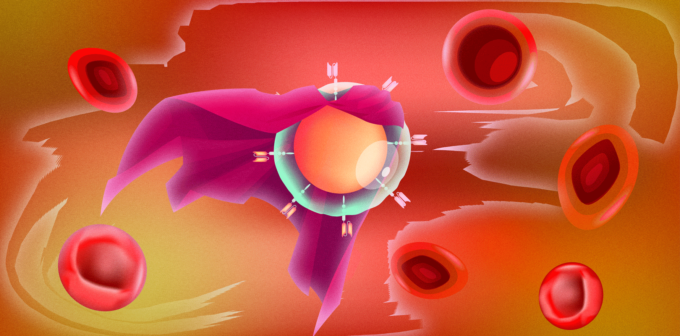
The cancer treatment has moved into rheumatology, with positive outcomes in lupus, scleroderma and myositis.
When autologous T cells were successfully engineered to identify and target cancer cells, the chimeric antigen receptor (CAR) T-cell therapy represented a major breakthrough in the treatment of previously untreatable B cell malignancies.
The therapy has now moved beyond blood cancers and is being explored in melanoma and solid tumour cancers – and more recently in rheumatology.
The German team pioneering CD19-depleting CAR T-cell therapy in B cell-driven autoimmune diseases presented several updates in clinical outcomes at the 2023 European Alliance of Associations for Rheumatology (EULAR) annual congress, providing hope for severe or treatment-refractory patients.
First up was the latest follow-up data on the team’s systemic lupus erythematosus patients who received CD19-depleting CAR T-cell therapy, presented by Georg Schett, professor of Internal Medicine at the Friedrich-Alexander University Erlangen-Nürnberg in Germany.
“We have seven patients presented here. They are all young, they have active disease, very critical, severe lupus with three to six organs involved and many failures of treatment – up to 15,” Professor Schett told delegates.
“All of these patients received glucocorticoids, hydroxychloroquine, [mycophenolate mofetil] and belimumab, and some of them many other drugs, including rituximab and cyclophosphamide,” he said.
Results for the first five patients were presented by Professor Schett at the Australian Rheumatology Association Annual Scientific Meeting in 2022 and were subsequently published in Nature Medicine. These patients now have follow-up data ranging from 11 to 22 months. The two further patients added to the cohort have follow-ups of four months and eight months.
All seven patients went into disease remission after treatment, with the latest data showing they have all maintained drug-free remission.
However, in response to an audience question, Professor Schett said he isn’t willing to call them “cured”.
“I think we need at least five years to say that they are probably cured or not. At the moment I think we are fine to say it’s drug-free remission.”
In wrapping up, he reminded the audience about the severity of the disease in the patients and their multiple drug failures to drive home how far they had come.
“The CAR T-cell therapy actually brought B cells down to zero, probably also in the tissues, which was associated with a resolution of disease activity, and is a remarkable resolution of autoimmunity,” he said.
“And after about 100 days, you basically get the B cell reconstitution phase with naive B cells, sustained drug-free remission and resolution of lupus. In this phase we have no treatment after the infusion of CAR T-cell therapy, just safety and efficacy monitoring.”
Asked about the appropriate patient for the therapy, Professor Schett said it should always be a severe patient.
“We started with severe treatment-refractory patients. That’s logic. But I think if the safety looks good, we could probably move a little bit more ahead to severe patients with a bad prognosis, where you intervene early to prevent the damage. Because the more damage you have the less reversible the disease is,” he said.
Professor Schett’s team also presented a new case study on CAR T-cell therapy for antisynthetase syndrome.
The team published a case report of a 41-year-old man with refractory antisynthetase syndrome earlier this year in a letter to The Lancet. They have since treated a second patient, a 43-year-old woman.
Both patients had active myositis with elevated CK levels, and muscle, skin and lung involvement. The second patient also had joint involvement.
Neither patient had responded to numerous immunosuppressive therapies, including cyclophosphamide and rituximab, with the first patient having tried five different treatments and the second patient, ten.
Both patients experienced mild cytokine release syndrome (grade 1) which quickly resolved, and the treatment was otherwise well tolerated.
CK levels were normalised and there were major clinical improvements in both patients, and they were able to stop all immunosuppressive therapy.
“Taken together, these data suggest that CD19 CAR T-cell therapy provides a possibility to intercept with severe ASS leading to drug-free remission, resolution of muscle and lung inflammation and abrogation of disease-associated autoimmunity,” the authors concluded.
And then it was scleroderma’s turn for CAR T-cell therapy.
There was an abstract from Professor Schett’s team on treatment of systemic sclerosis, which was also published as a letter in the Annals of the Rheumatic Diseases in May.
This case study was a 60-year-old man with severe refractory systemic sclerosis. At baseline, the patient had diffuse myocardial fibrosis, lung fibrosis, pulmonary hypertension, Raynaud’s phenomenon and carpal arthritis, and hadn’t responded to methotrexate or mycophenolate.
Six months after treatment, pulmonary fibrosis remained stable, and there were improvements in right ventricular strain, carpal arthritis and skin fibrosis, while Raynaud’s attacks were less frequent and less severe.
The treatment was well tolerated, with a mild fever after infusion (cytokine release syndrome grade 1).
“These data provide first evidence that CD19-targeting CAR T-cell treatment might be effective in severe SSc. The fast improvement of heart, joint and skin manifestations paralleled by seroconversion supports a central role of B cell-mediated autoimmunity in SSc,” the authors wrote.
However, they acknowledged that the conditioning therapy prior to CAR T-cell infusion may have contributed to the benefits, and suggested future studies could include an arm with conditioning therapy only to determine its effect.
Research into CAR T-cell therapy for lupus is starting to go commercial, with two biotechnology companies running trials in patients with lupus and lupus nephritis.
In the first instance, biotechnology company Cabaletta Bio, which has a translational research partnership with Professor Schett, announced that its CABA-201 CAR T-cell therapy has been granted fast track designation by the FDA and its investigational new drug application has been cleared.
An open-label phase I/II clinical trial, using an equivalent dose to that used by Professor Schett’s team, will be conducted in six lupus nephritis patients and six patients who have SLE with no renal involvement.
The second therapy to receive an FDA fast-track designation is Kyverna’s KYV-101. The therapy has shown efficacy and safety in patients with B-cell lymphoma, and at the EULAR 2023 congress the company presented the successful results of an in vitro study in cell lines from patients with lupus, lupus nephritis and rheumatoid arthritis.
The therapy will be put to a phase I clinical trial in patients with refractory lupus nephritis in the US. The company has also applied for approval for a phase I/II clinical trial among patients with lupus nephritis in Germany.
“Of course, the program is in its infancy,” said Professor Schett in his presentation, “but I think it’s really exciting”.

